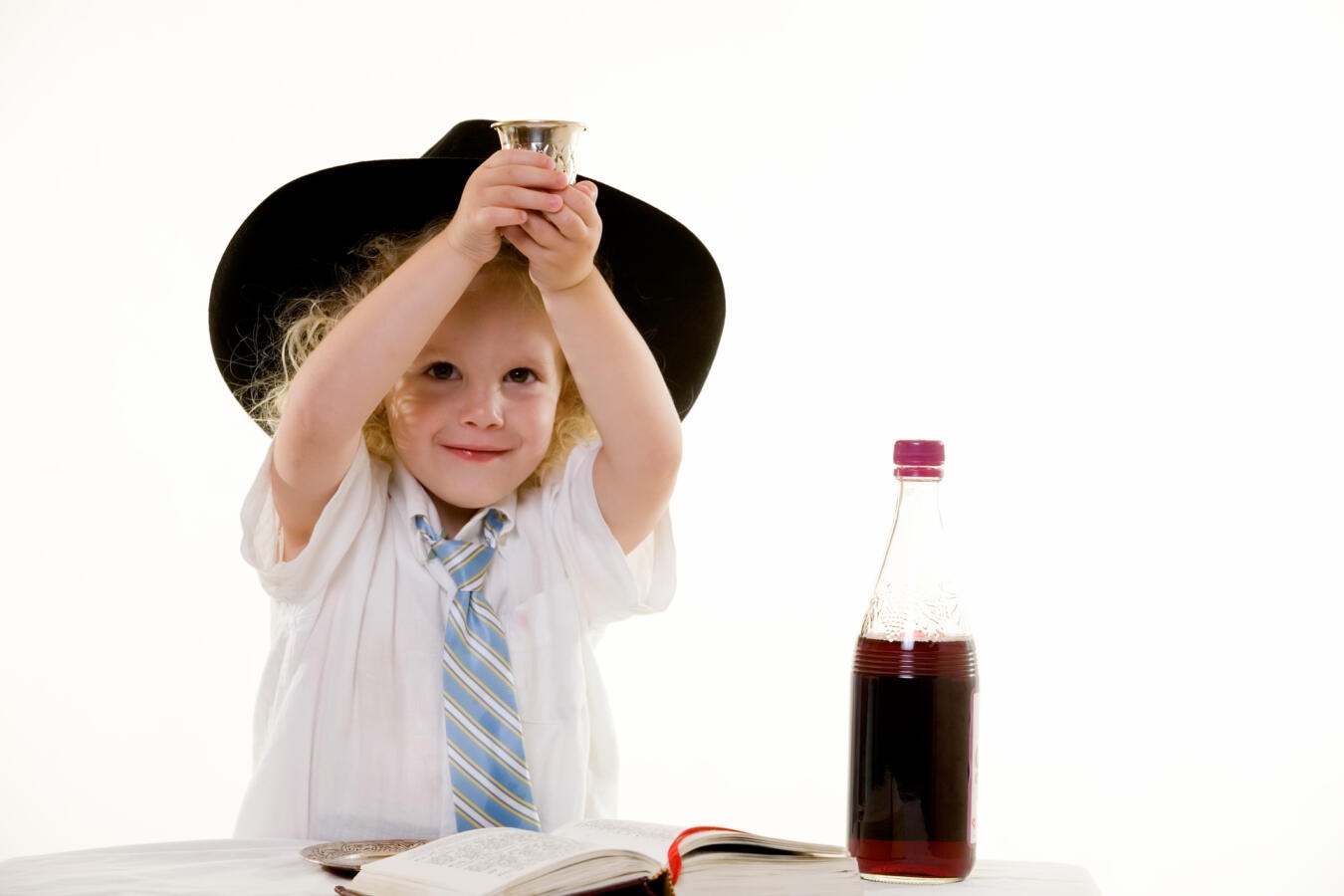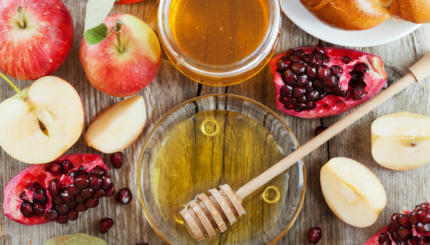, which means holiness, is the prayer over wine (or grape juice) that sanctifies and holidays.
Traditionally, Kiddush is recited (in two different versions) on Friday night and at Shabbat lunch. Other versions of the Kiddush are said on holiday eves and days.
Friday Night Kiddush
On Friday night, the Kiddush is recited over a full cup of wine or grape juice before sitting down for Shabbat dinner and before saying Hamotzi, the blessing over the challah. Traditionally, the Kiddush was recited by men. Today, in many households women or men recite Kiddush. After the Kiddush is recited, the cup is passed around so that everyone can take a sip from it. Many families have a special cup, called a Kiddush cup, reserved for this purpose. Kiddush cups can be purchased at Judaica stores and online.
The text of Friday night Kiddush begins with Vayechulu, a passage from Genesis 2:1-3 that describes the completion of creation. In that text, God steps back from six days of creation to rest on the seventh. The Jewish Shabbat is an imitation of this divine act.

Help us keep Jewish knowledge accessible to millions of people around the world.
Your donation to My Jewish Learning fuels endless journeys of Jewish discovery. With your help, My Jewish Learning can continue to provide nonstop opportunities for learning, connection and growth.
What follows then is an invitation to say the Kiddush, and the full text of the Kiddush itself which is actually two blessings. The first blessing is the traditional blessing over the “fruit of the vine” (which is why Kiddush is recited over wine or grape juice) followed by a sanctification of the holy Sabbath. This second blessing highlights the two major themes that are consecrated in Shabbat: creation (God rested on the seventh day) and redemption (God redeemed the Jewish people from Egypt so that they could follow the divine commandments, including observing the Sabbath). This blessing also thanks God for giving the Jewish people the Shabbat in love, and making them God’s chosen people.
Text of the Friday Night Kiddush
וַיְהִי עֶרֶב וַיְהִי בֹקֶר
יוֹם הַשִּׁשִּׁי. וַיְכֻלּוּ הַשָּׁמַיִם וְהָאָרֶץ וְכָל צְבָאָם
וַיְכַל אֱלֹהִים בַּיּום הַשְּׁבִיעִי מְלַאכְתּו אֲשֶׁר עָשָׂה. וַיִּשְׁבּת בַּיּום הַשְּׁבִיעִי מִכָּל מְלַאכְתּו אֲשֶׁר עָשָׂה
וַיְבָרֶךְ אֱלֹהִים אֶת יוֹם הַשְּׁבִיעִי וַיְקַדֵּשׁ אֹתוֹ. כִּי בוֹ שָׁבַת מִכָּל מְלַאכְתּו אֲשֶׁר בָּרָא אֱלֹהִים לַעֲשׂות
סַבְרִי מָרָנָן וְרַבָּנָן וְרַבּותַי
(!לחיים)
בָּרוּךְ אַתָּה ה׳ אֱֹלהֵינוּ מֶלֶךְ הָעוֹלָם בּוֹרֵא פְּרִי הַגָּפֶן
בָּרוּךְ אַתָּה ה’ אֱלֹהֵינוּ מֶלֶךְ הָעוֹלָם אֲשֶׁר קִדְּשָׁנוּ בְּמִצְוֹתָיו וְרָצָה בָנוּ וְשַׁבַּת קָדְשׁוֹ בְּאַהֲבָה וּבְרָצוֹן הִנְחִילָנוּ זִכָּרוֹן לְמַעֲשֵׂה בְרֵאשִׁית. כִּי הוּא יוֹם תְּחִלָּה לְמִקְרָאֵי קֹדֶשׁ זֵכֶר לִיצִיאַת מִצְרָיִם. כִּי בָנוּ בָחַרְתָּ וְאוֹתָנוּ קִדַּשְׁתָּ מִכָּל הָעַמִּים וְשַׁבַּת קָדְשְׁךָ בְּאַהֲבָה וּבְרָצוֹן הִנְחַלְתָּנוּ
בָּרוּךְ אַתָּה ה׳ מְקַדֵּשׁ הַשַּׁבָּת
(Quietly: Va-y’hee erev, va-y’hee boker.)
Yom ha-shishi. Vay’chulu hashamayim v’ha-aretz v’chol tz’va’am. Vay’chal Elohim bayom hash’vi’i milachto asher asa. Vayishbot bayom hash’vi’i mikol milachto asher asa. Vay’varech Elohim et yom hash’vi’i vay’kadesh oto. Kee vo shabbat mi-kol m’lachto asher bara Elohim la’asot.
Savri maranan v’rabanan v’rabotai.
L’chaim!
Baruch ata Adonai, Eloheinu melech ha-olam, borei p’ri hagafen.
Baruch ata Adonai, Eloheinu melech ha-olam, asher kid’shanu b’mitzvotav v’ratza vanu, v’shabbat kod’sho b’ahava uv’ratzon hinchilanu, zikaron l’ma’aseh b’reishit. Ki hu yom t’chila l’mikra-ay kodesh, zaycher l’tziat mitzrayim. Ki vanu vacharta v’otanu kidashta mikol ha’amim. V’shabbat kod-shi-cha b’ahava uv’ratzon hinchal tanu. Baruch ata Adonai, mi’kadesh ha Shabbat.
The sixth day: And the Heavens and the Earth and all they contained were completed, and on the seventh day God desisted from all the work that he had done. And God rested on the seventh day from all the work that he had done. And God blessed the seventh day and sanctified it, for on that day he rested from all the work which he had done in creating the world.
[Leader:] By your leave, rabbis, masters, teachers!
[Diners:] To Life!
Blessed are you, Lord our God, Ruler of the Universe, who creates the fruit of the vine.
Blessed are you, Lord our God, Ruler of the Universe, how has sanctified us with his commandments and favored us, and given us in love and favor his holy Shabbat as an inheritance, as a remembrance of the act of creation. For this day is the beginning of all holy days, a remembrance of the Exodus from Egypt. For you have chosen us and you have blessed us from among all the nations. And you have bequeathed us your holy Shabbat in love and favor. Blessed are you, Lord, who sanctifies Shabbat.
Shabbat Day Kiddush
On Saturday morning, the Kiddush is said after Shabbat morning services and before lunch. The prologue to Kiddush in this case is V’Shamru, a prayer that recalls that Shabbat is a sign of the divine covenant between God and the Jewish people.
The Shabbat morning version of the Kiddush focuses on God’s commandment for Jews to observe the Sabbath by refraining from work and to make it holy.
Text of Shabbat Day Kiddush
וְשָׁמְרוּ בְנֵי יִשְׂרָאֵל אֶת הַשַׁבָּת, לַעֲשׂוֹת אֶת הַשַׁבָּת לְדוֹרוֹתָם בְּרִית עוֹלָם. בֵּינִי וּבֵין בְּנֵי יִשְׂרָאֵל אוֹת הִיא לְעוֹלָם כִּי שֵׁשֶׁת יָמִים עָשָׂה ה’ אֶת הַשָּׁמַיִם וְאֶת הָאָרֶץ, וּבַיּוֹם הַשְּׁבִיעִי שָׁבַת וַיִּנָפַשׁ.
זָכוֹר אֶת יוֹם הַשַׁבָּת לְקַדְּשׁוֹ. שֵׁשְׁת יָמִים תַּעֲבוֹד וְעָשִׂיתָ כָּל מְלַאכְתֶּךָ, וּבְיוֹם הַשְּׁבִיעִי שַׁבָּת לַה’ אֱלֹהֶיךָ, לֹא תַעֲשֶׂה כָּל מְלָאכָה, אַתָּה וּבִנְךָ וּבִתֶּךָ, וְעַבְדֶךָ וַאֲמָתְךָ וּבְהֶמְתֶךָ, וְגֵרְךָ אֲשֶׁר בִּשְׁעָרֶיךָ. כִּי שֵׁשֶׁת יָמִים עָשָׂה ה’ אֶת הַשָּׁמַיִם וְאֶת הָאָרֶץ, אֶת הַיָּם וְאֶת כָּל אֲשֶׁר בָּם, וָיָּנַח בַּיוֹם הַשְּׁבִיעִי
עַל כֵּן בֵּירַךְ ה’ אֶת יוֹם הַשַּׁבָּת וַיְקַדְּשֵׁהוּ
בָּרוּךְ אַתָּה ה׳ אֱֹלהֵינוּ מֶלֶךְ הָעוֹלָם בּוֹרֵא פְּרִי הַגָּפֶן
V’Shamru v’nei Yisrael et Ha-Shabbat, la’asot et Ha-Shabbat l’dorotam b’rit olam beni u’vein b’nei Yisrael ot hi l’olam ki shehet yamim asa Adonai et ha-shamayim v’et ha-aretz u’vayom ha’shevi’i shavat vayinafash.
Zachor et yom Ha-Shabbat l’kadsho sheshet yamim ta’avod v’asita kol melachtecha uvayom ha-shevi’i Shabbat l’Adonai Eloheicha lo ta’aseh kol melacha ata uvincha uvitecha v’avdecha v’amat’cha u’v’hemtecha v’geircha asher bish’arecha. Ki sheshet yamim asa Adonai et ha-shamayim v’et ha-aretz et ha-yam v’et kol asher bam, vayanach bayom ha-shevi’i
Al kein beirach Adonai et yom ha-Shabbat vayikadsheihu
Baruch ata Adonai, Eloheinu melech ha-olam, borei p’ri hagafen.
And the Children of Israel kept the Shabbat, observing the Sabbath in every generation as a lasting covenant. Between me and the Children of Israel it is an eternal sign, for in six days the Lord made the Heavens and the Earth and on the seventh day he rested and was refreshed.
(This paragraph is Exodus 20:8-11.) Remember the Sabbath day and keep it holy. Six days you shall labor and do all your work. And the seventh day will be a Sabbath of the Lord your God. You shall do no work, neither you nor your son nor your daughter nor your manservant nor your maidservant nor your beast nor the stranger in your midst. For in six days the Lord made the Heaven and the Earth and the Sea and that they contain, and rested on the seventh day
Therefore God blessed the seventh day and sanctified it.
Blessed are you, Lord our God, Ruler of the Universe, who creates the fruit of the vine.
Kiddush for Holiday Eves and Days
Kiddush is also recited on the eve of many holidays and also midday on those holidays. Each holiday has its own version, and it is best to consult your siddur (prayerbook) for the correct text.
When “Kiddush” means Lunch
The word “Kiddush” is also used to refer to a communal gathering held immediately following Shabbat morning services at synagogue. A synagogue Kiddush can range from a quick get-together over wine or grape juice and challah to a full buffet lunch. Often synagogue members who are celebrating a simcha, or joyous occasion like a bar/bat mitzvah or wedding, will sponsor the Kiddush, usually meaning they cover the costs of the food and/or catering.
Audio of the Different Versions of the Kiddush (courtesy of Mechon Hadar)
Shabbat Evening (Friday)
Festival/Holiday Evening
Shabbat Morning (Saturday)
Shabbat/Festival Morning (Blessing the Wine, Not the Full Kiddush)
Sign up for My Jewish Learning’s RECHARGE, a weekly email with a collection of Shabbat readings and more to enhance your day of rest experience.
mitzvah
Pronounced: MITZ-vuh or meetz-VAH, Origin: Hebrew, commandment, also used to mean good deed.

Help us keep Jewish knowledge accessible to millions of people around the world.
Your donation to My Jewish Learning fuels endless journeys of Jewish discovery. With your help, My Jewish Learning can continue to provide nonstop opportunities for learning, connection and growth.



